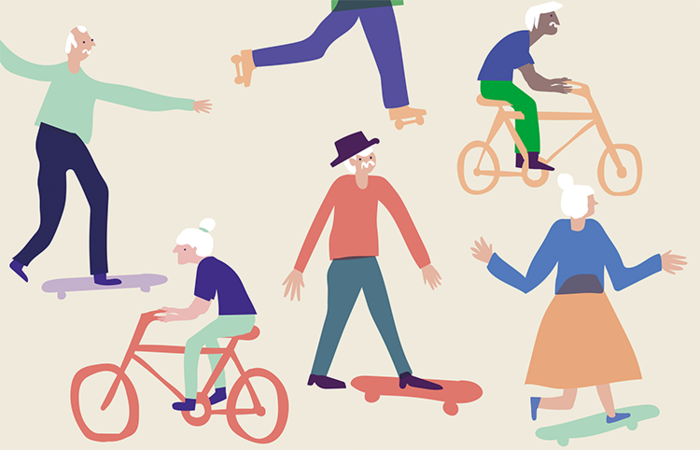On a biological level, ageing results from the impact of a wide variety of molecular and cellular damage over time. This leads to a gradual decrease in the physical and mental capacity. However, these changes are not consistent, and are just loosely associated with a person’s age. As people age, they as well as the society start believing in some assumptions about ageing. These assumptions have no evidence and over time these start surfacing as myths.
#1 ‘Genetic health conditions can’t be avoided as people age’
Genetics play an important role in determining a person’s longevity. But, it is also true that the major part of a person’s health is shaped by factors other than genes, i.e. physical and social environment, occupation, nutrition and exercise. Eating right and exercising are golden ways which add years to your life.
#2 ‘Old people are constantly ruminating’
Rumination is the process of constantly thinking about the same thoughts, which tend to be sad or dark. Rates of rumination increase, with the highest levels of ruminators being under the age of 25. Rates of rumination then begin to decline with age. Older adults, those 63 and older, ruminate the least. It is thought that greater life satisfaction protects older adults from rumination.
#3 ‘Elderly are less pliant to change.’
There are some people who like the thrill of a change whereas there are others who are more sluggish about the same idea. However, it is a personal preference and definitely not an age related issue. The elderly people have lived and experienced numerous instances of a change and reached a certain age. They may be slow to adapt to a change but they are surely capable at it.
#4 ‘Ageing makes you less adventurous.’
There are numerous elderly people who have waited their entire life for retirement. Many make special investment to plan their post retirement life and travel the world. Some even take part in adventure sports or try out new things.
#5 ‘Memory loss is certain as people age.’
Every ageing individual does not necessarily suffer from memory loss diseases like Alzheimer’s. Some individuals show incredible retention of memory even at the age of 80 years. WHO reports that the estimated proportion of the general population aged 60 and over with dementia at a given time is only between 5-8%.
#6 ‘Old people think in an orthodox way’
Every individual, regardless of the age, has his or her own way of thinking, processing and feeling about the society. It’s pointless to assume that an individual of the same age will have the same beliefs. Taking some time to talk to the elderly, will definitely help you understand their thoughts better.
#7 ‘Elderly people are cack-handed’
Elderly people who keep their brain busy by involving in cognitively stimulating activities, exercising their body and indulging in spiritual activities, are pretty much competent in their later years. Even as they age or experience some memory loss, some elderly have tremendous abilities to understand and make rational decisions.
#8 ‘Productivity goes on a downward spiral as people age.’
Retirement doesn’t mean that elderly people relax at home and do nothing. Due to health conditions some elderly will prefer resting, but many people have active lives. They would volunteer for social causes, are actively involved in household chores or taking care of their grandchildren. Some may actively take part and plan activities for the welfare of the society.
#9 ‘Ageing leads to loneliness in the elderly.’
Many elderly get involved in discussions and activities with the community. What looks like an elderly’s empty calendar, is actually very busy. Some elderly people even make new friends or hang around with some old ones. A study says that, being socially active in 50s and 60s is linked to lower dementia risk.
#10 ‘Creativity deteriorates as people age’
Retirement brings resources and time to take up lost hobbies like art and craft. Many elderly take up these activities post retirement and are even able to turn it into a second source of income.
These myths limit our perception and acceptance towards the concept of ageing. However, the truth is we all want to grow old gracefully. But how do we go about it? We at Synapsium believe that, in order to live well in our older years, we need a tailored lifestyle plan and commitment to healthy ageing.
Authorship: Akshay Dixit, Community Outreach Coordinator at Synapsium

